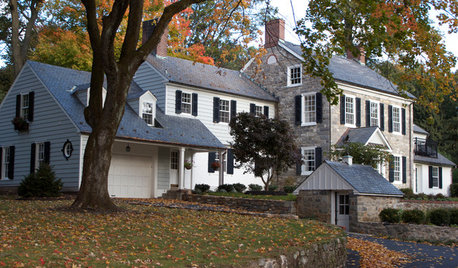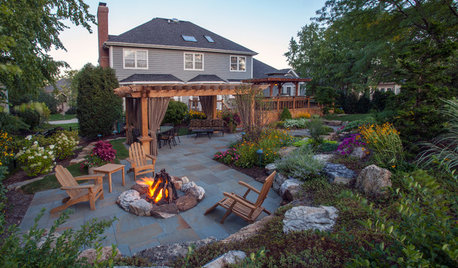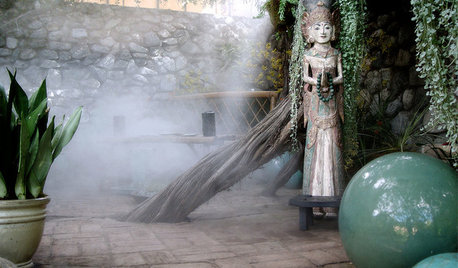Anyone else here heat with fuel oil?
seagrass_gw Cape Cod
last year
Featured Answer
Sort by:Oldest
Comments (45)
Related Discussions
Fuel Pump rebuild went bad; fuel in oil
Comments (9)Shucks, I accidentally hit submit . .................................................... Are you quite certain that the gas you are now discovering, was not already in the oil from before you undertook this rebuild? What may be damaged depends on how long the engine "ran" with contaminated and diluted oil. If the engine had been running with gas in the oil before the fuel pump work, I would expect the exhaust would have had a definite blue or blue-white color "smoke" in it. In which case, the most likely components to suffer damage would be the crankshaft rod journal and connecting rod, the piston and cylinder walls might have sustained some "scoring" or galling, but usually, the piston and cylinder of a 4 stroke engine, are "spared" in cases of gasoline contaminated oil in the crankcase. It usually requires that these engines be "run without any oil" before the piston and cylinder walls see damage (of course by that time, the crank and rod is usually "trashed" as well). Consider a 2 stroke engine escapes damage to the piston and cylinder with as little as 1 part oil to 50 parts gasoline. Also consider the the same amount of oil is sufficient to lube the crank main and rod journals in a 2 stroke engine, but ONLY DUE TO the 2 stroke design using ball or roller bearings in those 2 places. Plain bearings in the typical 4 stroke OPE engine will NOT survive long if run with diluted oil. If all the time this engine has actually run with gas in the oil, amounts to a mere 20 to 30 seconds, I believe all you have "suffered" is a solvent washing of the interior surfaces of the engine. Post engine numbers and let's see if we can find some illustrations of that carb. Maybe then we can retrace your steps during reassembly of the pump....See MoreAnyone Else Here from Myrtle Beach?
Comments (9)Hi, Glad to see that there are a couple more at least! I have numerous Tall Bearded irises, but I have very great limitations on space and so until I move (which is hopefully soon), I will have lots for trade. Since I hope to move in the fall, I am hoping to find some folks locally who might be interested. I also have daylilies which look to be growing well enough to divide soon. I'm seeking a BIG yard, and it will be a first for me... I'm still interested in trading even if I don't get to move too soon. Let me know if you guys would like any photos. I'm at matbeach1@aol.com Mike...See MorePhoenix propane fueled unit for Radiant and DWH or something else
Comments (1)I am shocked that anyone would do PV and be considering electric DHW. You do realize that solar hot water is about 5x the efficiency of PV (it might be closer to 10x)? I am curious what your estimated heating needs are? Propane matched with PV seems strange to me. Ah - but you are in CA. I guess that might make sense with your electric rates. But please heat your water with solar. I would consider solar for running the radiant. 200k btu seems like a lot. I'm assuming you are at elevation. But even still that seems like a lot. I am in a similar size house and I am under 100k btus and only because a/c drives the sizing here. We get under 10 degrees (but not often).I think man J puts our heating needs closer to 50k btus. I am similarly surprised that PV makes sense in a second home situation unless you rent. But typical second homes used 10-20% of the time are hard to justify PV even at $.40 a kwh. I'm curious what you get to sell at, because around here we just get $.15/kwh. So even with Fed and state rebates and a subsidized selling market, it takes a good sized southern roof to justify PV (in a $ sense)....See MoreHeating Oil is $4.60 a Gallon here
Comments (9)"I looked up "heat punp" on Wikipedia and don't understand it. I mean, I understand the physics aspect of it but not how it works in your house." - A heat pump is simply a central air conditioning unit that has a reversing valve and produces heat in the winter and a/c in the summer. If you have existing ductwork for a central a/c system, you're good to go for a heat pump....See Moreseagrass_gw Cape Cod
last yearlast modified: last yearbragu_DSM 5
last yearcarolb_w_fl_coastal_9b
last yearnicole___
last yearElmer J Fudd
last yearlast modified: last yearElmer J Fudd
last yearlast modified: last yearseagrass_gw Cape Cod
last yearlast modified: last yearwishiwereintheup
last yearseagrass_gw Cape Cod
last yearhappy2b…gw
last yearlast modified: last yearhappy2b…gw
last yearseagrass_gw Cape Cod
last yearlast modified: last yearAlisande
last yearhappy2b…gw
last yearfunctionthenlook
last yearlikestonehomes
last yearlast modified: last yearElmer J Fudd
last yearlast modified: last yearElmer J Fudd
last yearmaifleur03
last yearElmer J Fudd
last yearlast modified: last yearlily316
last yearlaceyvail 6A, WV
last yearseagrass_gw Cape Cod
last yearmaifleur03
last yearElmer J Fudd
last yearlast modified: last yearmaifleur03
last yearElmer J Fudd
last yearlast modified: last yearseagrass_gw Cape Cod
last yearlast modified: last yearkevin9408
last yearElmer J Fudd
last yearKathsgrdn
last yearjrb451
last yearAnnie Deighnaugh
last yearseagrass_gw Cape Cod
last yearlast modified: last yearseagrass_gw Cape Cod
last yearAnnie Deighnaugh
last yearseagrass_gw Cape Cod
last yearseagrass_gw Cape Cod
last yearGargamel
last yearseagrass_gw Cape Cod
last year
Related Stories

ARTHere’s Looking at You: Supersize Portraiture at Home
Go big. Go bold. Hang huge portraits on blank walls for maximum impact
Full Story
KITCHEN CABINETSChoosing New Cabinets? Here’s What to Know Before You Shop
Get the scoop on kitchen and bathroom cabinet materials and construction methods to understand your options
Full Story
HOUSEKEEPINGIt’s Time to Clean Your Gutters — Here’s How
Follow these steps to care for your gutters so they can continue to protect your house
Full Story
INSIDE HOUZZHere’s Why Kitchen and Bath Renovations Are Costing More
The 2019 U.S. Houzz & Home report shows that costs have steadily risen in recent years, a trend expected to continue
Full Story
GARDENING AND LANDSCAPING3 Ways to Bring the Heat to Outdoor Living Spaces
Here’s what to know about surviving winter’s bite with an outdoor fireplace, fire pit or heat lamp
Full Story
REMODELING GUIDESClean-Burning Woodstoves Ignite a Greener Heating Trend
No need to rely on oil or gas to heat your home — new woodstove designs burn cleanly and are beautiful to boot
Full Story
FEEL-GOOD HOME7 Strategies for Beating the Heat This Summer
High temperatures are breaking records. Here are ways you can cope
Full Story
FLOORSWhat to Ask When Considering Heated Floors
These questions can help you decide if radiant floor heating is right for you — and what your options are
Full Story
BEDROOMSThe Cure for Houzz Envy: Master Bedroom Touches Anyone Can Do
Make your bedroom a serene dream with easy moves that won’t give your bank account nightmares
Full Story
GREAT HOME PROJECTSHow to Add a Radiant Heat System
Enjoy comfy, consistent temperatures and maybe even energy savings with hydronic heating and cooling
Full Story





seagrass_gw Cape CodOriginal Author